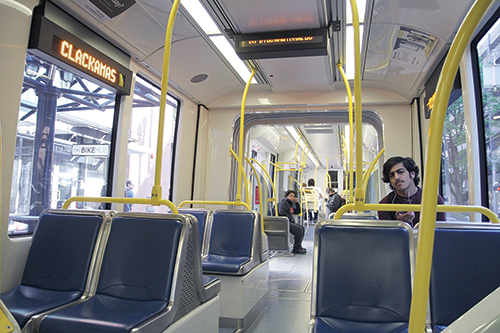
TriMet has decided to use street-clothed officers to better patrol fare dodgers and disruptive or abusive people. This is completely unacceptable. The first issue I have with it is that, uniform or no uniform, the outcome is the same: People who plan on skipping the fare will see the officer and get off, and a disruptive individual will most likely cease being so in the presence of an officer.
So the goal must not be to curb the act, but to cash in on the offenders. Why else would TriMet put officers in a position where they can wait until after the act is committed before intervening? The concern is no longer focused on the act but on the punishment. Putting officers in street clothes is an open confession of TriMet’s willingness to allow an act to occur in order to make a few extra dollars off the offender.
My assertion is pretty accurate considering TriMet’s financial circumstances. The agency’s financial troubles are well documented and have resulted in the elimination of both Fareless Square and the Free Rail Zone, along with various other changes.
Skipping the fare carries a $175 fine, so there’s a big financial incentive to catch violators. While TriMet slashes its budget it needs ways to increase revenue, and getting $175 per violator rather than $2.50 from an abiding rider makes the use of undercover officers all the more appealing.
So, rather than prevent people from skipping the fare, it makes more financial sense for TriMet to allow folks to board without paying the fare and then bust them. I’m just not sure this is ethical.
Another issue I have is that the punishment doesn’t fit the crime. Not paying the $2.50 for a MAX ticket shouldn’t result in a fine as high as $175. Also, not paying for a ticket equals being charged for “theft of services and trespassing.” This in addition to the fee is a pretty big charge for someone who stole $2.50 worth of services.
The whole policy just reeks of TriMet trying to squeeze everything they can get out of violators rather than persuading them not to skip the fare.
I won’t lie: On the one or two occasions a week that I use the MAX, I never pay. Granted, I generally only go from campus to Pioneer Square and from Pioneer Square to Goose
Hollow, but paying for something that was free for years seems wrong.
If I were to see an officer on the MAX as I approached or boarded the train, I’d get off and walk my lazy behind to where I need to go. I would accept a fine if I were given one, sure, but getting set back $175 wouldn’t make me reconsider skipping the fare any more than a $30 fine would. The huge difference between those two numbers is what I take issue with.
Don’t misunderstand me: I’m not saying people shouldn’t pay the fare or should be abusive to others on public transportation. If everyone responsibly paid their dues, TriMet would be better off and perhaps be able to provide even better service with the increased funds.
Plus, if you’re dumb enough to get caught you deserve a temporary exclusion.
This is precisely how I think TriMet should handle violators—by temporarily banning them. But having a policy in place that’s designated to ensure maximum retribution isn’t the best option.
Cash rules everything, however, so a monetary punishment would have to be in place. TriMet should keep officers in uniform, put a few more out there, charge violators with a $15–30 fine and ban them for one month.
TriMet officers’ job is to catch violators, and they shouldn’t have to sneak around in order to do it. Besides, having men in uniform not only stops the act from occurring but also serves as a lasting image that will dissuade the offender from attempting the act in the future. While taking a hefty sum from violators by disguising the officers does the trick, it’s precisely that—a trick, and a cruel one at that.

